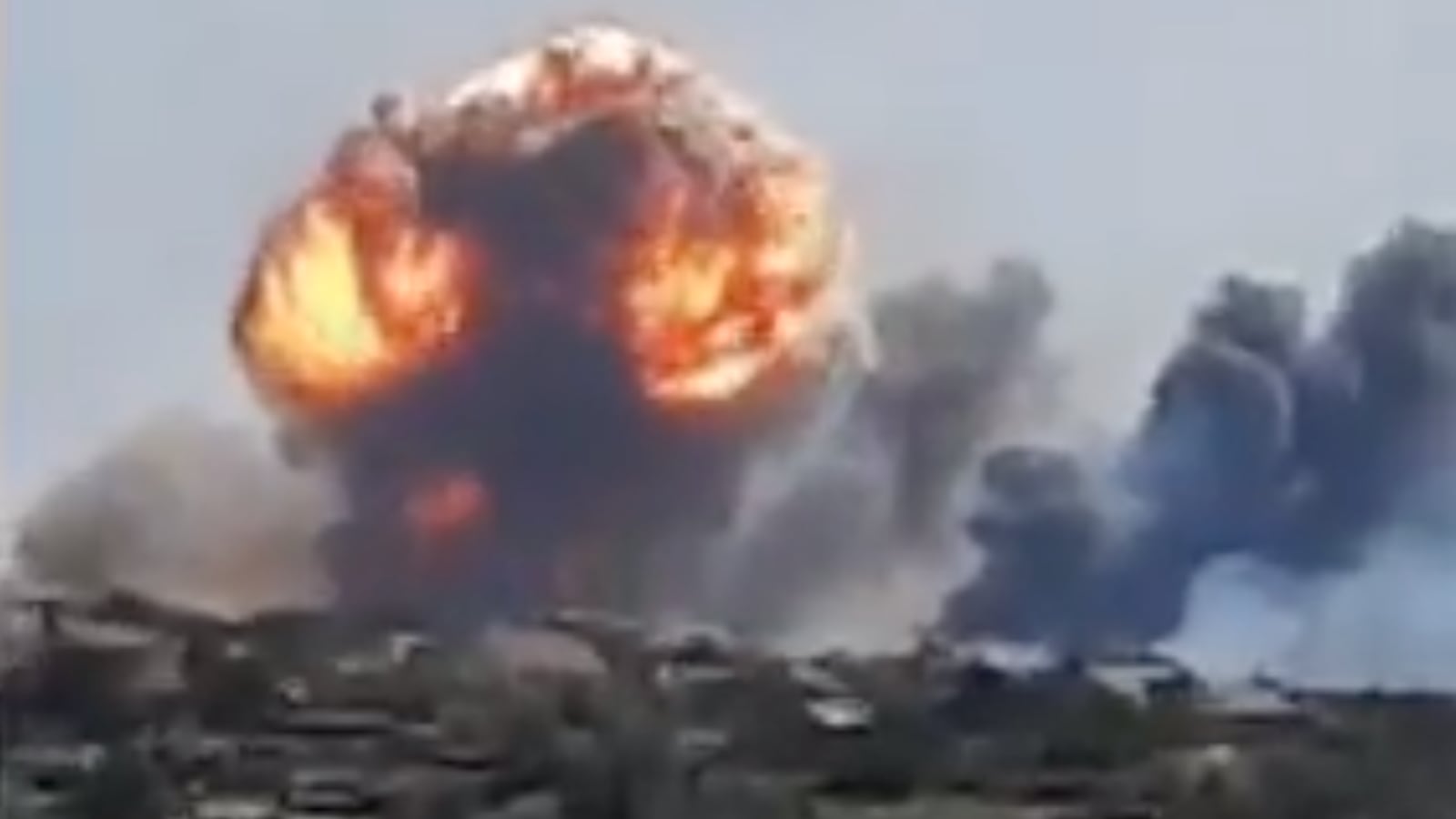Questions have been raised about the Kremlin’s version of events after several massive explosions were seen erupting from a Russian military airbase in Crimea on Tuesday.
Videos of the blasts at the Saki base on the Russian-controlled peninsula were shared on social media. In a statement, the Russian defense ministry said the explosions had been caused as a result of aviation munitions detonating, though no explanation was given as to what had caused the ordnance to explode. They also claimed that there were no casualties as a result of the explosions, nor was there any damage to aviation hardware at the site. “Measures are being taken to extinguish the fire and find out the causes of the explosion,” the ministry added, Russian state media reported. “According to a report from the site, there was no fire impact on the bunded ammunition storage area at the airfield.”
Despite the Kremlin’s denials, a contradictory narrative quickly emerged. An unnamed Ukrainian military official told the New York Times that Ukrainian forces were indeed behind the blasts. “This was an air base from which planes regularly took off for attacks against our forces in the southern theater,” the source said, adding that a “device exclusively of Ukrainian manufacture was used” in the attack.
The diverging stories over the cause of the air base explosions join a growing list of disputed events in Ukraine in recent weeks. Both Kyiv and the Kremlin blamed each other as being responsible for internationally condemned explosions at Europe’s largest nuclear power plant, Zaporizhzhia, at the weekend. And both belligerents pointed the finger at one another for an apparent air strike on a prison in Olenivka which left dozens of Ukrainian prisoners of war dead.
Independent analysts looking at footage of Tuesday’s blasts in Crimea have also raised questions about the Kremlin’s latest story. Open-source intelligence analyst Oliver Alexander was particularly curious about two explosions appearing to erupt at almost the same time, despite being some distance apart. “They’re almost simultaneous, those two explosions, so I don’t really think that would be an accident,” Alexander told The Daily Beast.” It would be very unlikely, unless they happened to happen at exactly the same time.”
Alexander therefore thinks the blasts are likely to have been a Ukrainian attack. “I can’t really think what else it could be,” he says. “If it was just one explosion, sure, it could be an accident, stuff happens. I can’t really say anything for certain until I see satellite imagery tomorrow where you can see exactly what was hit, but it does seem like both of the munition storage sites were hit almost simultaneously, which seems strange for it being an accident.”
The Russian defense ministry’s line that there were no casualties may also turn out to be untrue, Alexander speculates, given the alarming proximity of the explosions to civilian housing. “I’m not exactly sure who lives there—it could also be houses for soldiers and stuff, but they still have families,” he says. “I don’t know what the situation is, if they’ve evacuated that area before or what have you. But those houses probably don’t exist anymore.”
And aside from video evidence, Alexander says the denial would be consistent with a Kremlin strategy when it comes to dealing with potentially embarrassing military stories. He points to the example of the Kremlin’s narrative around the April sinking of the Russian warship Moskva, the vessel that was on the receiving end of the now immortal Snake Island battle cry: “Russian warship, go fuck yourself.” Ukrainian forces claimed to have destroyed the Moskva with anti-ship missiles, while Russia’s defense ministry put forward a shifting kaleidoscope of stories about the vessel’s demise, claiming first that an accidental fire caused munitions on board to explode before the ship sank in stormy seas while being towed back to port. “They usually start by denying,” Alexander says, “Then [they call it an] accident, and then they just kind of go quiet.”





